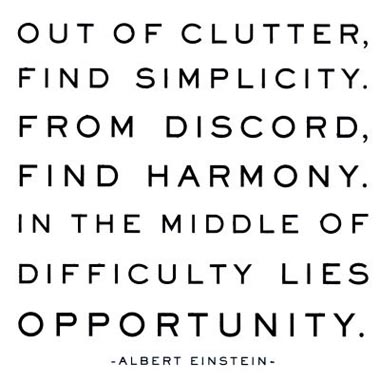Success Advice
10 Ways To Be A Super Effective Organizer

Being more organized can change your life for the better and can even result in you becoming more successful. After all, when you have things in order, you will be likely to get more done and achieve more of your goals. In fact, most highly successful people share the trait of being organized in most aspects of their lives.
If you want to experience this for yourself, then below are 10 ways you can become a better organizer!
How To Be Awesomely Organized
1. Create a To-Do List
A to-do list is extremely important if you want to keep your days in line and make sure that you get everything done. While you certainly can keep a pen and paper with you at all times, there are phone apps you can use instead. These apps track your to-do list and even remind you about deadlines so that you don’t forget things. There are also computer software programs you can use to write and track things you need to get done.
Tip: Try to minimize this list to four or less things, or else you could end up becoming overwhelmed.
2. Find Places for Things
At home you should have things to put your trash, laundry, toiletries and other items. In the office you should have bins for things you’ve done, things you need to get done and everything else. Make sure you can easily access the things that you use most often, as this will save you a lot of time. For instance you can start creating online invoice, which will help you have a record of all your expenses and you can tally them at the end of the month.
Tip: Purchase organization products; they are well worth the investment.
3. Get Rid of Clutter
A lot of people hang onto things that they think they “might need/use” later on. Unfortunately these cause a lot of clutter and generally never end up being used. Simplify your life by getting rid of clutter and letting it go! When you’re not focused on the clutter, you will be more focused on things you need to get done right now.
4. Get Things Done Right Away
Procrastination is only going to cause you problems, so this is a trait you definitely need to change. Get things done as soon as you can, rather than putting them off until later on. Not only will this help you be more organized, it will also reduce the amount of time you waste during the day.
Tip: It’s especially helpful to do things that you don’t want to do right away. Knock out the worst things first so the rest seems easier.
5. Color Code Tasks
If you truly can’t get to something right away, like a paper you have to review, then put it into a color coded folder. For example, red could be urgent matters that need to get done ASAP and green can be things you need to get done within the next week.
These can be kept in your briefcase, office or even your home to make sure you see them throughout the day. If colour codes don’t quite get you there, then draw little pictures on them to inspire you to work through your daily tasks, this works for me.
Organization Quote #1
Early in my career I felt that organization would destroy my creativity. Whereas now, I feel the opposite. Discipline is he concrete that allows you to be creative. – Verna Gibson
6. Keep a Schedule
Write down dates of things that you have to do, like pay bills or turn in huge projects. You should also keep track of meetings and set alerts ahead of time so you are sure you are prepared in advance.
Tip: Use a dry erase calender so you can easily add, remove and edit things on your schedule. Or use a phone app so you can easily track and remind yourself of things you need to get done.
7. Create Small Goals
When you make huge goals that are difficult to accomplish you could end up not meeting them because you become overwhelmed. Small goals that you can actually accomplish will result in getting more done and making sure you can complete them as you anticipate. Keep goals written on your main calendar and make sure to update them as you progress.
8. Have a Positive Attitude
Powerful people have go-getter attitudes that are positive and willing to try. If you just try being more positive about things that you need to accomplish, then you will see a really huge change in the way that you get things done. If you take a look at successful business owners, then you will see that they are positive, energetic and have great attitudes about their work.
Tip: Watch videos or listen to audio recordings of career coaches and motivational speakers to give you a new perspective and attitude.
9. Set Priorities
You have to take note of what your priorities are if you want to be successful. This means knowing what you want and not being sorry for taking time out for it. Everyone has priorities and they are all different, so it’s important to be true to yours and what you want. You have to make a list, and make sure that you start with #1 and work your way down. Put the most important thing at the top, most of the things we keep putting off we usually push to the bottom of the list.
This is an absolute must for those who are procrastinators. When you find you have a free day, write a new list (Your PUNCH! list) and put your most “put off tasks” at the top and knock them out one by one, you will feel so much better for it.
10. Use Time Wisely
If you find yourself daydreaming, then ask yourself what you could be doing instead. Making more use of your time will ensure that you get more done and that you don’t postpone important tasks.
Even if you have to switch your cell phone off or unplug the TV for a few hours, nothing moves unless you do. Block out distractions and get to working on the most important tasks.
Organization Quote #2
Have a time and place for everything, and do everything in its time and place, and you will not only accomplish more, but have far more leisure than those who are always hurrying. – Tryon Edwards

Business
Scaling a Business? Here’s What Usually Goes Wrong
Before you hire, expand, or chase bigger revenue, here’s what every founder needs to fix to scale without losing control, culture, or quality.

Growing a business is the dream. But scaling one? Honestly, that is a completely different reality. (more…)
Personal Development
From Classroom to Boardroom – How to Transition Successfully
Moving from classroom to corporate? Here’s how to navigate career transitions, master workplace culture, and stand out in the boardroom.

The transition from academic life to corporate work is major and often tough, requiring careful planning and preparation. (more…)
Did You Know
This Move Can Help You Keep More of Your Income
What if keeping more of your income wasn’t about earning more, but choosing a smarter place to live?

Living more cheaply often makes the biggest difference when money is tight. If rent feels too heavy or bills climb faster than expected, changing where you live might help a lot. (more…)
Business
How to Build a Brand That Actually Connects (For Businesses of Any Size)
Brand growth in 2026 isn’t about shouting louder; it’s about clarity, consistency, and human connection that customers genuinely trust.

In the middle of a busy workday, it’s easy to view brand building as a luxury. Honestly, we often treat it like a coat of paint we apply after the house is built. But as we navigate the landscape of 2026, it’s become clear that branding is actually the foundation. (more…)
-

 Business4 weeks ago
Business4 weeks agoWhat Every Business Owner Should Know Before Investing in API Integration
-

 Business3 weeks ago
Business3 weeks agoHow Smart Brands Use Instagram Data to Outperform Competitors
-

 Business4 weeks ago
Business4 weeks agoThe Paradox of Modern Work: Can Tech Make Us More Human?
-

 Change Your Mindset2 weeks ago
Change Your Mindset2 weeks agoThe Hidden Reason You Can’t Stay Consistent
-

 Entrepreneurs2 weeks ago
Entrepreneurs2 weeks agoThe Six Pillars That Ground Purpose-Driven Leadership (The Berenyi Life Blueprint)
-

 Change Your Mindset3 weeks ago
Change Your Mindset3 weeks agoThe Real Psychology Behind Quitting Too Soon
-

 Business3 weeks ago
Business3 weeks agoHow AI Agents Can Quietly Expose Your Business to Serious Risk
-

 Business2 weeks ago
Business2 weeks agoDIY vs Delegate: The Real Reason You’re Burned Out





























1 Comment